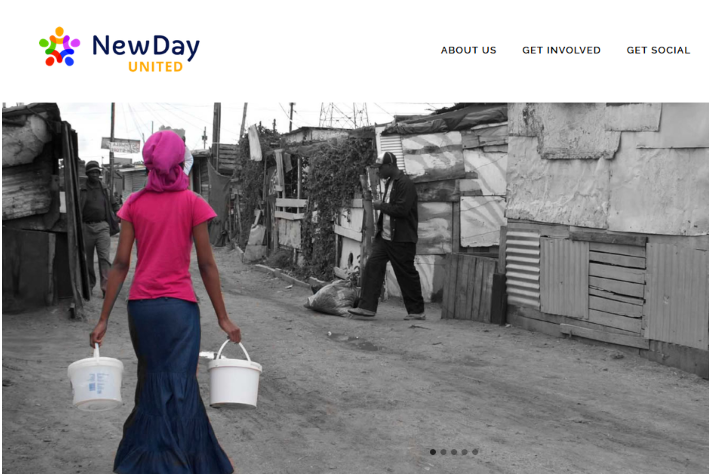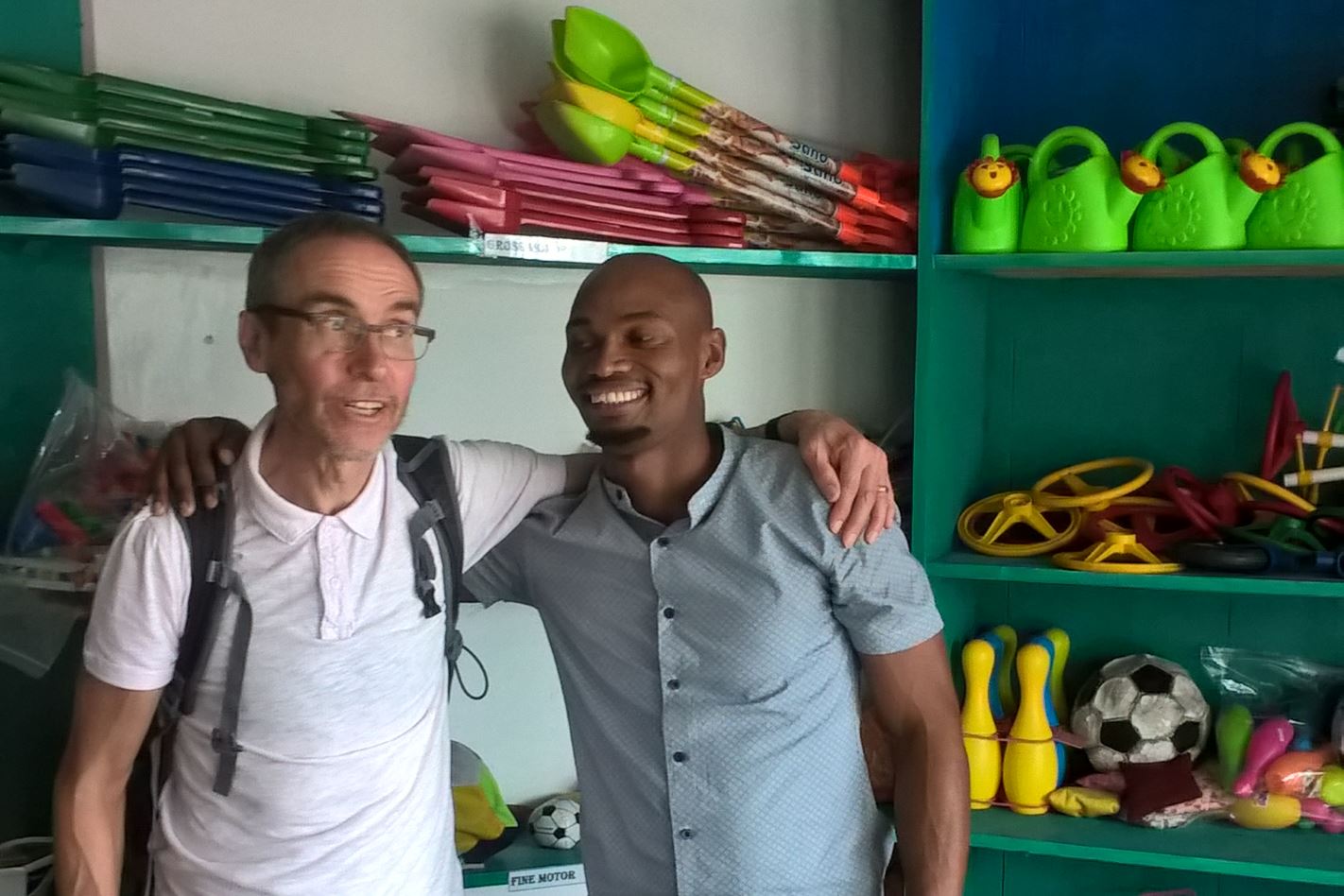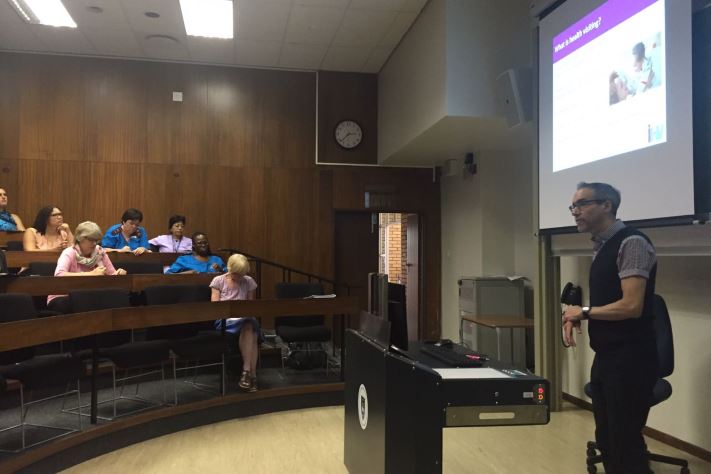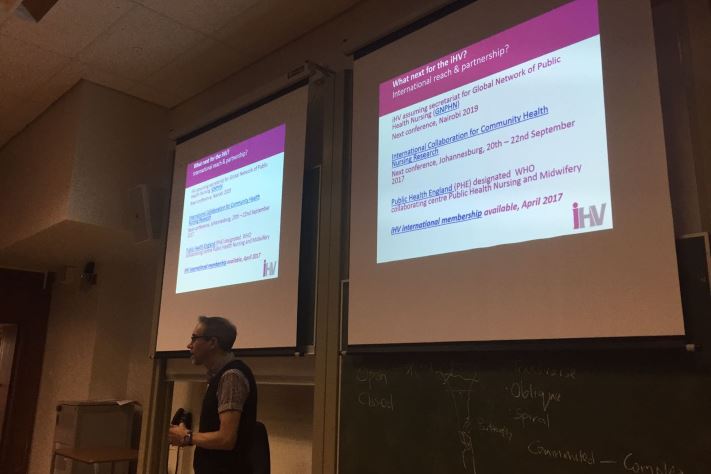25th April 2017
The third and final in a series of blogs by Dr Robert Nettleton, Education Advisor, Institute of Health Visiting, on his travels to Cape Town, South Africa through his Florence Nightingale Foundation Travel Scholarship 2017.
Robert is keeping us up to date with his travels and professional visits through regular Voices blogs – Read the blog from his first week and his blog from his second week.
In my third week, I have had opportunities to engage with policy level organisations as well as visit projects in Khayelitsha, a township of about 1 million that, at a distance, has the appearance of a blanket of irregular corrugated sheets beneath which are shacks or similar low quality housing. Health statistics cannot be equated to the UK, or at least not since our classic slums of the 19th century industrialisation of our great cities.

Source: ‘NewDayUtd’, an organisation that inspired my initial interest in South Africa by its work ’championing’
On Monday and Wednesday, I had meetings at DG Murray House, the HQ of DG Murray Trust. The Trust takes a strategic approach as a private funder to support social development with a strong emphasis on early childhood and approaches that are both innovative and inclusive. They host in their offices a number of organisations that they support. I had meetings with Cape Town Embrace, SmartStart, Ilifa Labantwana and the DG Murray Portfolio Manager for Resourceful Young Children, Fefekazi Mavuso.
Cape Town Embrace
Cape Town Embrace takes the first 1000 Days agenda to heart and it has been trying out ways of bridging the shared experience of motherhood and parenting across yawning divides of material resources, race and culture. These initiatives draw upon the ‘ordinary magic’ outlined by Ann Maston, whose research identified that some children and families survive and even thrive despite adverse odds. The three common factors in such circumstances are
- A caring parent/caregiver;
- another caring adult; and
- modest access to opportunity at crucial times in a child’s life.
Embrace seeks to find ways of connecting mothers with other mothers who are available to offer friendship and support that is undemanding and accessible. I was impressed by the imagination and creativity brought to this, ranging from 1:1 ‘social connectors’ to large scale social events, in keeping with DG Murray’s intention to broker connections between ‘people of like and unlike and who are committed to the same goal’.
Julie Mentor, who leads Cape Town Embrace, was candid about the necessary learning that has to be part of innovation. For example, the social distance between middle class, mainly white South African women, and a mother bringing up children in a shack in an informal settlement is immense and cannot always be bridged. That said, it is not impossible either – in fact, the whole premise of the new South Africa is that this HAS to be possible. So, it is in this ‘space’ that so much learning is taking place.
This takes me to two recurring themes highlighted both in conversation with DG Murray Trust programme manager, Fefe, and through observations in specific programmes:
- What do we consider ‘essential’ when resources are so highly constrained relative to need?
- How are effective and quality relationships possible across communities, between health workers and families and, most crucially, between the emerging infant and their immediate care-giver(s) in a fragmented and repeated traumatised context?
SmartStart
Carol-Ann Foulis developed SmartStart to occupy a space where quality childcare and learning for young children was not accessible – leaving parents to rely on unregulated creches and childminding in conditions lacking stimulation and a safe, nurturing environment at the most basic level. So, SmartStart is a package that informal providers of childcare can adopt as franchisees on a developmental track, perhaps similar to becoming a registered childminder in the UK.
Sikhula Sonke
Sikhula Sonke is an example of a relatively established provider of ‘educare’ that has broadened its scope to develop a Family and Community Motivator programme. This programme creatively and proactively engages with families to draw on their own assets and wider resources to nurture and stimulate their young children.
The day after my visit there, Thembe was due to attend an award ceremony for her use of gathering places around water taps for engaging with women and children in learning and play activities. Sikhula Sonke also engages with fathers who, due to a complex historical and cultural legacy of social isolation, are often marginal to their children’s lives.

Robert with Simbongile, who works in the Toy Library and loves to provide play and stimulation for young children, engaging with dads as well as mothers.
The Toy Library manager models the role of young men in the lives of children through play. I was moved by his heart towards children that he said came from the place they have in the heart of God.
Ilifa Labantwana
Ilifa Labantwana is another organisation hosted by DG Murray. Colin Almeleh and Jabu Tugwana were interested to ask about the UK’s Red Book, how we use growth charts, and other sources of practical guidance – to see if they could be used by workers with relatively low levels of education and training. At the same time, such practical skills and knowledge can only be effectively deployed within effective and acceptable working relationships.
Philani
Philani is well respected for a quality and sustainable community-based approach to child health, care and education within impoverished communities.
Their Mentor Mothers programme takes, as its guiding light, David Olds’ Nurse Family Partnership model from the USA and, from Vietnam, the concept of the ‘positive deviant’ drawn from the local community. So, mentor mothers engage in proactive home visiting antenatally and postnatally in ways familiar to health visitors – except that these trained workers are paid only a small stipend and are drawn from the local community. The First 1000 Days focus is central to their work. Its stands in contrast to a widespread rather minimal and medicalised, clinic-based antenatal and postnatal health service that is sometimes intimidating to mothers, especially if they are otherwise vulnerable.
Presentation on health visiting and the centrality of relationships to quality of care
I was prompted to reflect on the moral crisis in the UK’s recent history about the urgency to place compassion as central to healthcare and, especially to nursing. Blaming the victim will not ‘do’ when community health workers often work out of highly-pressured and unrelating workloads in poor conditions with little training or reward. So, when I was invited to address a wide group of practitioners/ professions/ service providers/ policy makers at a one-off seminar, I chose, following consultation, to focus on relationships.
I had an audience of about 25 people in a lecture theatre at the Red Cross Memorial Hospital and gave a session on health visiting and the centrality of relationships to quality of care, followed by a Q&A session.
Elmarie Malik (Head of Paediatrics, Tygerberg Hospital, who provides leadership in First 1000 days strategy) had sent out a wide invitation. I had a diverse audience – an impressive array! I chose to be honoured rather than intimidated and thought to myself ‘this is what being a Fellow of the iHV is for!’ and needed to be worthy of Florence Nightingale’s advocacy of ‘health nursing’ as distinct from ‘sick nursing’.
In my session, I covered supportive / restorative supervision as well as resilience. Despite, or because of the resource constraints and the pressures of ‘continuous trauma’, this was not seen as a luxury to be deferred to some imagined better days ahead. However, discussion took us into dialogue about detail and practicality. For example, the question of screening for health needs without the wherewithal to respond to meet them. I reflected that this issue was common to the UK, albeit at a different scale of need. The health visiting principle of ‘search for health needs’ is more holistic and realistic than screening, and our tiered model of universal, universal plus and universal partnership plus reflects proportionate universalism, whereby the perfect does not have to be enemy of the good, but we stimulate awareness of health needs and facilitate health by building on assets, strengths and capabilities.
The pros and cons of a home visitor from within or beyond the community were debated. The outsider has to cross boundaries, but the insider has to respect boundaries of confidentiality. In communities riven by gang rivalries, gossip and stigma can be major issues, especially when community health has been dominated by HIV and TB work in recent decades.
Other familiar topics were the ‘resources’ issue, the ‘measuring impact’ issue, and ‘case for prevention’ issue. I was most impressed when someone said ‘First 1000 Days is our time for a revolt!’ Fighting talk!
‘In this space’
In any culture or endeavour, we all have our ‘own’ terms, phrases and so on that we habitually employ, that have taken-for-granted meaning.
I was asked ‘What is this “commissioning”?’, a term that dominates professional discourse in England at present. A phrase I heard many of my contacts use was ‘in this space’. No one gave me a definition of how the term is employed, but it seems to equate roughly to an arena of action and policy where there are numerous actors engaged on shared issues or enterprise, although in more or less contested ways. If I take this to be a fair understanding, then I can recognise that there is an equivalent ‘space’ in the UK that concerns children’s public health and the range of services, policies and issues.
I found ‘spaciousness’ a thought-provoking metaphor to seek to make sense of my experiences in South Africa. On the one hand the level of resource relative to need is massively constraining. On the other hand, there is a multiplicity of initiatives and organisations that seem to proliferate, sometimes in inchoate ways.
From a public policy point of view, this is structured around the three major departmental silos of Health, Social Development and Education. The UK is familiar with such demarcations and successive attempts to coordinate, collaborate or integrate across such boundaries. In Western Cape Province, a significant number of actors across these structures are coming together, galvanised by a vision for the First 1000 days to create a space wherein these boundaries can be dissolved to better reflect the undifferentiated experience of babies and infants as they emerge into their world. This is a highly complex and often troubled world – added to the vertical administrative structures are layers of administration at city, province and national level; and at the societal level, profound inequalities borne out of iniquitous historical injustices. In one conversation, a businessman said to me, South Africa has no ‘average’. Even if there was such a point, it would belie any attempt to fix, because although inequalities are highly persistent, South Africa is by no means a static society. Civil society is both fiercely loyal to South Africa and its multitude of cultural roots and capacities and critical of the status quo. While I was there, political ferment at national level led to the Rand being given ‘junk status’ by international credit rating agencies, with dire implications for the economy, which inevitably have greatest impact on the poorest of the poor. There were mass demonstrations declaring ‘Enough is enough’ and [President] ‘Zuma must go’.
What impressed me is that, with a high level of political awareness, there are NGOs, professions, church leaders, funders, community groups and public services for which the First 1000 Days is indeed a space for action, even revolt. In comparison, the UK is much better resourced and more highly regulated. But in South Africa, the metaphor of ‘in this space’ indicates a sense of pragmatic hopefulness and enterprise.
And final reflections…
As I conclude my final blog, this leaves me with a task to reflect more deeply on lessons for clinical leadership in the UK:
In what ways do we find ourselves displaced and repositioned by our context?
Across the four nations of the UK our health and social care systems are increasingly divergent from each other, with varied approaches to a Healthy Child Programme. In England, we have a multitude of commissioners creating unprecedented local variability. Health visiting education in England faces a very uncertain future.
How do I respond to what this space offers? Do I recognise that this context is a space I share with others? To what do I say Yes or No; or Yes, and… ; or No, but… ?
What do we consider essential to an effective quality health visiting service? What are alternative roles for health visitors within increasingly constrained budgets?
How do I reckon with the past and its legacies? What does justice mean; what must be left behind and what cherished; what is essential to give all children the probability that they will survive and thrive (key terms in the First 1000 Days strategy in Western Cape)?
How might this apply to reductions in HV establishment in the UK workforce? Greater Skill and Grade mix in an integrated workforce?
Finally,
Do I question the given-ness of the status quo – the inevitability of things? If South Africa had not done this, apartheid would still exist.
I left South Africa on Easter Saturday. It is a much less secular society than the UK and so it seemed apt to reflect that Easter Saturday is the dark day in the heart of Christian narrative, widely accepted across South Africa, between ultimate darkness of Good Friday and ultimate hopefulness of resurrection on Easter Sunday.
Or, as the secular prophet Leonard Cohen sang,
‘There is a crack in everything,
That’s how the light gets in.’
Robert Nettleton




